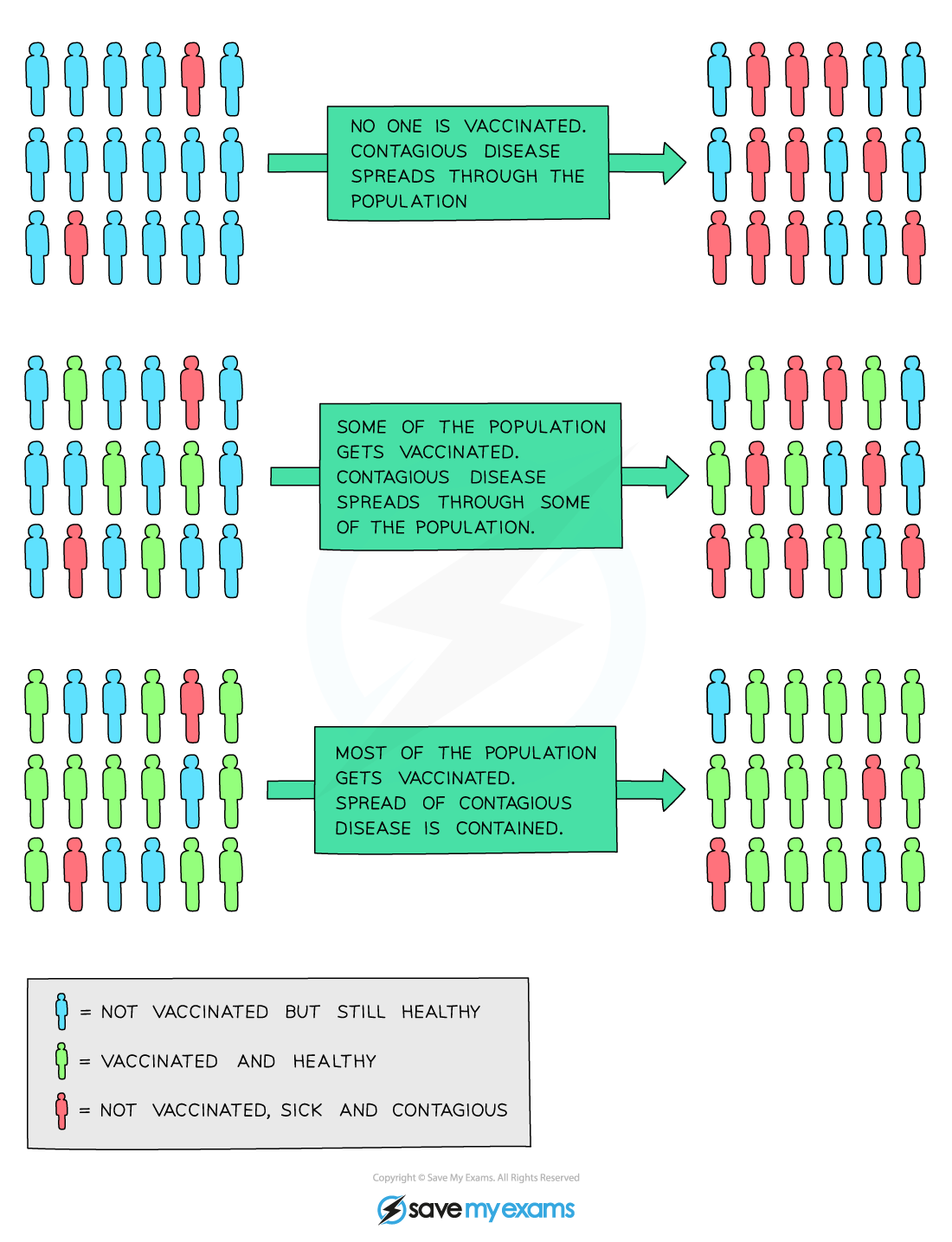Vaccines & Immunity (DP IB Biology): Revision Note
Vaccines
A vaccine is a source of antigens or DNA/RNA which codes for antigens
The vaccine is introduced into the body to induce immunity without causing the disease
Vaccines cause a specific immune response where antibodies are released by plasma cells
There are different types of vaccine, including
Live attenuated - these are weakened versions of the pathogen
Inactivated - these are killed, non-living components of pathogens or even just the antigens alone
Vaccines are administered either by injection or orally (by mouth)
The vaccinations given by injection can be into a vein or muscle
Vaccinations produce long-term immunity as they cause memory cells to be created
The memory cells recognise the antigen when re-encountered and produces antibodies, in what is a faster, stronger, secondary response
Vaccination & antibodies graph

Examiner Tips and Tricks
Remember vaccines trigger the primary immune response (T helper cells trigger B plasma cells to secrete specific antibodies) which leads to the production of memory cells which will give a faster and larger (higher concentration of antibodies) secondary response.
Herd Immunity
If a large enough percentage of the population is vaccinated, it provides protection for the entire population because there are very few places for the pathogen to breed - it can only do so if it enters the body of an unvaccinated person
This is known as herd immunity
If the number of people vaccinated against a specific disease drops in a population, it leaves the rest of the population at risk of mass infection, as they are more likely to come across people who are infected and contagious This increases the number of infections, as well as the number of people who could die from a specific infectious disease
Herd immunity diagram

Vaccinating a large enough percentage of the population provides protection for the entire population; this is herd immunity
Herd immunity prevents epidemics and pandemics from occurring in populations
This is the reason that many vaccinations are given to children, as they are regularly seen by medical practitioners and can be vaccinated early to ensure the entire vaccinated population remains at a high level
In certain instances, vaccination programmes are run with the aim of eradicating certain dangerous diseases, as opposed to controlling them at low levels
An example of a disease which has been eradicated as a result of a successful vaccination programme is smallpox, which was officially eradicated in 1980 after a vaccination programme run by the World Health Organisation since the mid-1950s
NOS: Scientists publish their research so that other scientists can evaluate it
Data that is collected by scientists, to support theories in their research, is peer reviewed; this means that other scientists in the same field can judge the accuracy and validity of any conclusions drawn
Once research has been published, other scientists may use this research to aid further work
In some situations the media may report on the findings of scientific studies before the full peer review process has been carried out; this can cause issues in public responses to new findings, for example:
When new medicines or vaccines are tested, the media may report on the side effects before tests are complete
The public view may be biased towards the media presentation of research, which may not be accurate
This can be damaging to the progression and implementation of any new medicines
It is important that the public are aware of this problem of media reporting on incomplete research, though education on this is often not present in media reports
When evaluating the introduction of a new medicine or vaccine, scientists tend to use a pragmatic approach, meaning that they consider the overall practicalities and effectiveness of a new treatment, rather than the certainty of its effect on individuals
I.e. a vaccine in testing may be safe and effective, but may result in unpleasant side effects for a very small number of individuals; scientists would draw the overall conclusion that this vaccine can be rolled out to the public, but an individual receiving the vaccine would not be certain that they wouldn't experience any negative side effects
In the case of COVID-19 vaccine development, the pragmatic approach was applied in order to develop an effective vaccine as quickly as possible; results of trials showed that the vaccine was safe and effective for the vast majority of people, though there were a small number of individuals who experienced medical difficulties
Although the vaccine showed a high degree of efficacy, there was a level of distrust from the public due to some of the representation of negative side effects in the media

Unlock more, it's free!
Was this revision note helpful?
